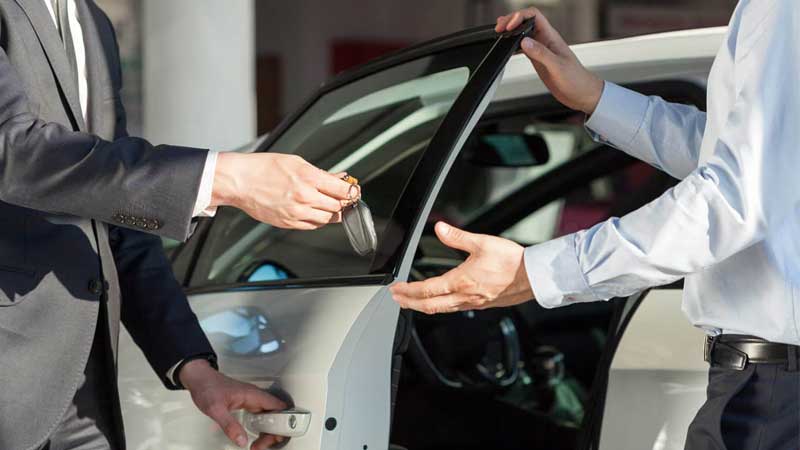Buying a car is a significant decision that requires careful consideration. Whether you opt for a brand-new vehicle or a used one, each choice has its advantages and disadvantages. The decision depends on various factors, including budget, preferences, and long-term goals. This article explores the pros and cons of buying a new car versus a used car, helping you make an informed decision.

Cost Considerations When Buying a Car
One of the primary factors in buying a car is the cost. New cars come with a higher price tag compared to used ones. The latest models have advanced features, modern designs, and improved safety technologies, but they also come at a premium price.
New Car Costs
New cars are more expensive due to advanced technology, better fuel efficiency, and warranties.
They require higher down payments and monthly installments if financed.
Taxes and insurance rates are generally higher for new cars.
Used Car Costs
Used cars are significantly cheaper, making them more budget-friendly.
Lower insurance rates and taxes help reduce overall costs.
Depreciation is less drastic since the previous owner absorbed the initial drop in value.
If budget constraints are a concern, a used car may be the better option. However, if you prioritize owning the latest model with advanced features, a new car may be worth the investment.
Depreciation: The Biggest Financial Factor in Buying a Car

Depreciation is the rate at which a car loses its value over time. This is a crucial factor when deciding whether to buy a new or used car.
Depreciation in New Cars
A new car loses about 20-30% of its value within the first year.
Within five years, a new car may lose up to 60% of its original value.
Rapid depreciation means new car owners face a significant loss if they resell within a few years.
Depreciation in Used Cars
A used car has already gone through its steepest depreciation.
Owners do not experience a major loss in value after purchase.
Used cars hold their resale value better compared to new ones.
If avoiding depreciation is a priority, buying a car that is two to three years old is a smart financial move.
Warranty and Reliability in Buying a Car

Warranty and reliability play a significant role when buying a car, as they affect maintenance costs and peace of mind.
New Car Warranty and Reliability
Comes with a manufacturer’s warranty covering repairs for a certain period.
Fewer chances of mechanical problems.
The latest safety and technology features ensure a smoother driving experience.
Used Car Warranty and Reliability
The warranty may have expired, leaving buyers responsible for repairs.
Older vehicles may require frequent maintenance and part replacements.
Certified Pre-Owned (CPO) programs offer limited warranties for used cars.
If you value peace of mind and lower maintenance costs, buying a new car with a warranty is a great option. However, if you’re comfortable with occasional repairs, a well-maintained used car can be just as reliable.
Insurance and Registration Costs When Buying a Car
Insurance and registration fees are often overlooked but can significantly impact the total cost of ownership.
Insurance Costs for New Cars
+ More expensive due to higher replacement values.
+ Comprehensive and collision coverage is recommended, increasing costs.
+ Newer models with advanced safety features may qualify for lower premiums.
Insurance Costs for Used Cars
+ Lower premiums since used cars have lower replacement values.
+ Owners can opt for minimum coverage, further reducing costs.
+ Older models may not qualify for some insurance discounts.
+ Registration Costs
+ Registration fees are generally higher for new cars.
+ Used cars often have lower registration costs.
Considering the long-term expenses, buying a used car may be more affordable in terms of insurance and registration fees.
Features and Technology in New vs. Used Cars
The latest models come with advanced technology and features that enhance safety, comfort, and performance.
New Car Features
+ Equipped with the latest technology, including smart infotainment systems and driver assistance.
+ Improved fuel efficiency and eco-friendly options like hybrid and electric cars.
+ Enhanced safety features such as automatic braking and lane departure warning.
Used Car Features
+ May not have the latest technology, but still offers essential safety features.
+ Fewer options for hybrid or electric models.
+ Some used cars may lack modern conveniences such as touchscreen displays and keyless entry.
If having cutting-edge features is a priority, a new car is the better choice. However, if you only need basic functionality, a used car is a practical alternative.
Financing Options for Buying a Car
Financing plays a crucial role in the decision to buy a car, affecting monthly payments and interest rates.
Financing a New Car
+ Lower interest rates due to manufacturer incentives.
+ Longer loan terms available, reducing monthly payments.
+ Higher overall cost due to interest accumulation.
Financing a Used Car
+ Higher interest rates compared to new cars.
+ Shorter loan terms, resulting in higher monthly payments.
+ Lower overall cost despite slightly higher interest rates.
If you qualify for low-interest financing, a new car may be a viable option. However, if minimizing debt is important, buying a used car with a shorter loan term is advisable.
Environmental Impact of Buying a Car
The environmental impact is another factor to consider when buying a car.
New Cars and the Environment
+ More fuel-efficient and environmentally friendly.
+ Hybrid and electric models reduce carbon footprints.
+ Manufacturing new cars consumes more resources and energy.
Used Cars and the Environment
+ Buying used reduces the demand for new car production, lowering carbon emissions.
+ Less electronic waste compared to new models.
+ Older cars may have lower fuel efficiency, increasing emissions.
If sustainability is a priority, opting for a fuel-efficient used car or a hybrid/electric new car is a responsible choice.
Conclusion: Which Option is Best for You?

When buying a car, both new and used options have their benefits. Your decision should align with your financial situation, preferences, and long-term goals.
Buy a New Car If:
+ You want the latest features, technology, and safety advancements.
+ You prefer a full warranty and minimal maintenance.
+ You are willing to pay a higher price for long-term reliability.
Buy a Used Car If:
+ You have a limited budget and want to avoid high depreciation.
+ You want lower insurance and registration costs.
+ You don’t mind occasional repairs and maintenance.
Ultimately, buying a car is a personal decision that should be based on financial readiness, lifestyle needs, and long-term considerations. Whether you choose new or used, a well-researched decision ensures you get the best value for your money.

